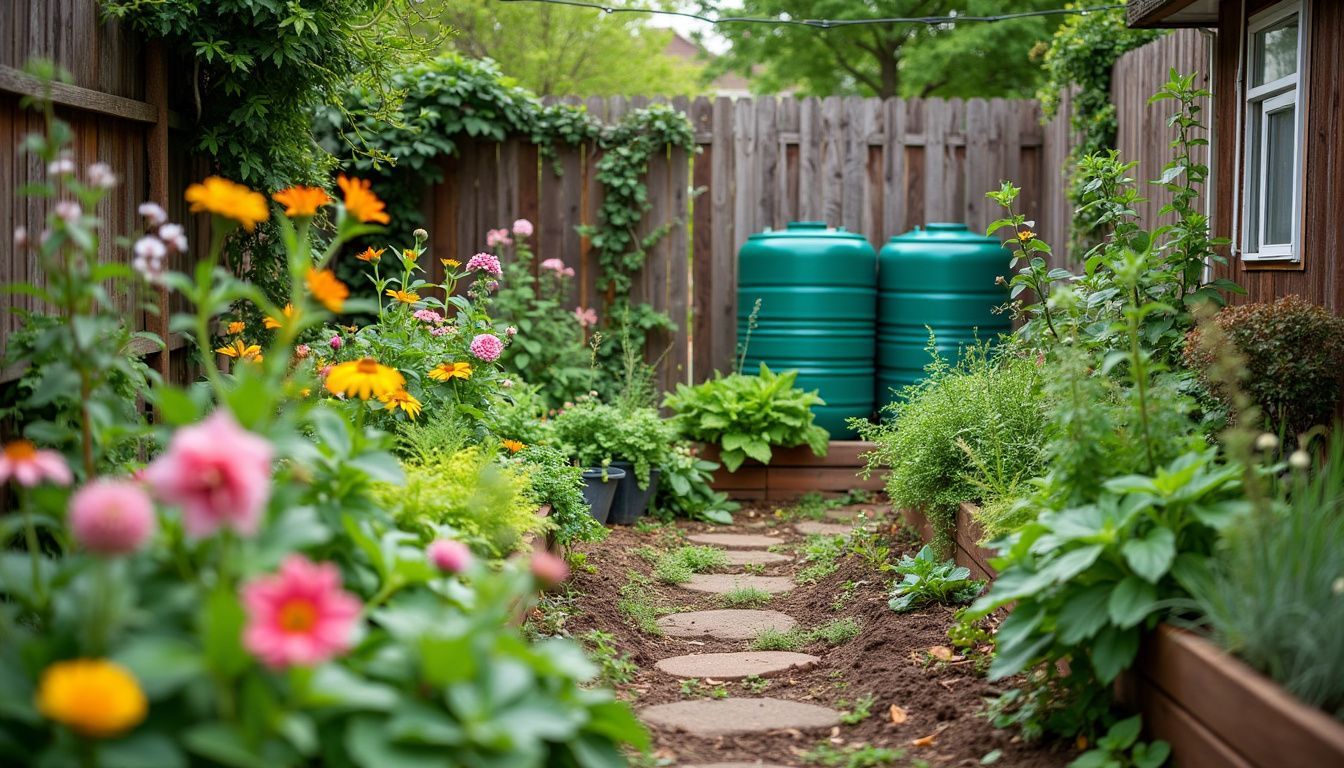Creating a sustainable garden that’s easy to maintain might seem like a big challenge, but it’s quite doable with the right knowledge. A sustainable garden works with nature to support local wildlife and reduce its ecological footprint.
This type of gardening uses native plants because they require less water and care, making them easier to grow. Saving water through methods like drip irrigation and collecting rainwater helps make your garden more eco-friendly.
Instead of relying on chemical fertilizers, adding compost can naturally enrich your soil. Using natural pest control solutions protects the environment. Lastly, choosing plants that don’t need much attention saves you time and effort.
This article will guide you in creating a beautiful garden that thrives while also being kind to our planet. Keep reading for some helpful tips!
Key Tips for Creating a Sustainable Garden
Creating a sustainable garden starts with choosing the right plants. Focus on native species that thrive in your area and require less water.
Choose native plants
Native plants thrive in their local environment. They require less water and care. These plants attract local wildlife, making your garden ecofriendly. Choose drought-resistant plants to save on water.
They adapt well to your region’s climate. Native plants also boost biodiversity, supporting bees, birds, and butterflies. This choice reduces the need for fertilizers and pesticides.
It makes your garden more sustainable.
Using native plants paves the way for easy maintenance. Regular watering and weeding will keep your garden healthy.
Use less water
Choosing native plants can greatly influence water usage. Native plants adapt well to local climates and need less water. These plants thrive with the rainfall naturally provided in your area.
Implementing a drip irrigation system offers precise watering. This method delivers water directly to the roots. It minimizes evaporation and runoff, ensuring water conservation in gardening.
Mulching around plants helps retain moisture in the soil. It also reduces the frequency of watering. Collecting rainwater in barrels can provide a cost-effective solution for garden hydration.
Using drought-resistant plants can further lower your water consumption. Such ecofriendly gardening practices create a sustainable garden that’s easy to maintain.
Minimize fertilizer use
Using less fertilizer benefits your garden and the environment. Many conventional fertilizers can harm soil health and nearby wildlife. Instead, focus on sustainable plant choices.
Native plants often thrive without extra fertilizers. They adapt well to local soil and climate conditions. Compost acts as a great alternative. It enriches the soil naturally and improves its structure.
By adding compost, you support earth-friendly gardening practices. This method decreases dependence on chemical fertilizers. You also create a more self-sustaining garden. Choose organic gardening methods to further enhance soil life.
This approach ensures a low-maintenance garden that stays healthy over time.
Maintaining a Sustainable Garden
To keep your sustainable garden thriving, you need to water it regularly and remove unwanted weeds. Adding compost enriches the soil while low-maintenance plants require less attention and care.
Regularly water and weed
Watering your garden regularly keeps your plants healthy. In a sustainable garden, aim to use water-efficient gardening methods. Grouping plants with similar needs can help you conserve water.
Weeding is just as important. Weeds compete with your plants for nutrients and water. By removing them, you allow your desired plants to thrive. Regular maintenance prevents weeds from taking over.
This practice supports the overall health of your eco-friendly garden design.
Choose low-maintenance plants to save time and effort. They often require less water and care. This helps create a self-sustaining garden that benefits the environment.
Add compost to soil
Adding compost to soil strengthens your garden. Compost improves soil structure and boosts nutrients. It retains moisture and supports healthy plant growth. Create compost from kitchen scraps, yard waste, and leaves.
This process helps reduce landfill waste and enriches your garden naturally.
Incorporate compost into the soil before planting. It enhances drought-resistant plants’ ability to thrive. Regularly adding compost makes your garden more eco-friendly and resource-efficient.
This simple practice supports sustainable landscaping efforts. Using compost also minimizes the need for chemical fertilizers. A self-sustaining garden benefits greatly from rich, organic matter.
Practice sustainable pest control methods
Sustainable pest control methods promote healthier gardens. Use natural solutions to manage pests effectively. Beneficial insects like ladybugs and lacewings can help keep harmful pests in check.
Create a welcoming habitat for them by planting diverse flowers and shrubs. You can also use companion planting. This technique pairs plants that naturally repel pests. For instance, marigolds can deter nematodes.
Avoid using harsh chemicals that harm the environment. Instead, consider organic pesticides made from natural ingredients. These options are safer for both the garden and local wildlife.
Regularly monitor your plants for signs of pests. Early detection helps control infestations before they spread. With these eco-friendly gardening practices, you can maintain a thriving, low-maintenance garden while being kind to the planet.
Choose low-maintenance plants
Practicing sustainable pest control methods leads to a healthier garden. Choosing low-maintenance plants enhances your garden’s ease of care. Drought-resistant plants thrive with little water.
These plants grow well in various conditions. Native plants also attract local wildlife. They require less maintenance and adapt easily. Using these plants supports eco-friendly garden design.
A low-maintenance garden saves you time and energy. Select species that naturally resist pests. This approach aligns with environmentally friendly gardening practices. Enjoy a self-sustaining garden that contributes to your local ecosystem.

